Bread Loaf School of English Confers 49 Master’s Degrees
RIPTON, VT. – The Middlebury Bread Loaf School of English concluded its 104th session by conferring 49 master’s degrees across three campuses, including 48 Master of Arts and one Master of Letters degrees.
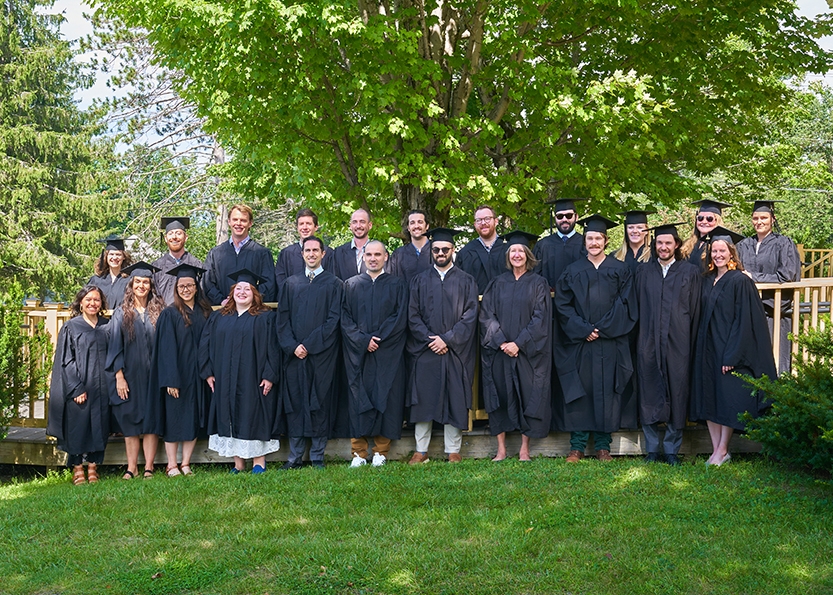
Of the graduates, 23 studied in Vermont for their final summer, 14 at Oxford, and five at Bread Loaf’s California campus at the Middlebury Institute of International Studies. Seven finished their Bread Loaf studies by completing independent research projects online.
Bread Loaf celebrated graduates of the class of 2023 at its Vermont campus on Saturday, August 12. Dean Emily Bartels kicked off the ceremony with a recognition that students pour their hearts, minds, bodies, and souls into a 24/7 learning experience that demands not just serious study but deep engagement with faculty, actors, and peers in and out of the classroom.
Senior class co-president Forrest Brown spoke on the theme of weirdness. Bread Loaf, he said, was the first place he felt his unusual qualities were embraced and he could confidently be himself. At Bread Loaf, students learn how to ask original questions of literature, to imagine unconventional worlds, to be shaken, and to seek possibility through the weird. Graduates, Brown urged, should take the responsibility to create Bread Loaf spaces in the world that protect and foster weirdness and allow imagination to blossom.
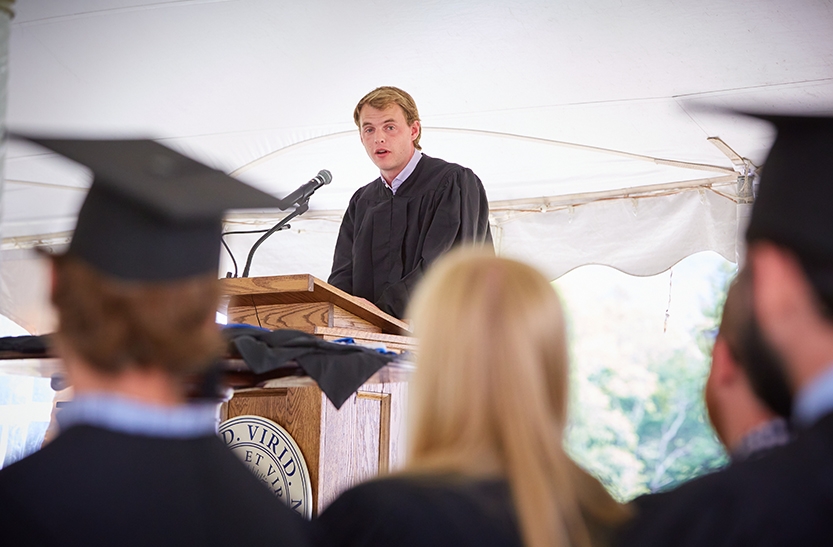
Fellow co-president Anna Mae Zabrowski then reflected on the impossibility of distilling the Bread Loaf experience and cherishing precious memories of literary revelation, the discovery of a kindred soul, a sparkling conversation by a fire – all untold stories that define Bread Loaf and remain tucked in each graduate’s heart.
Bread Loaf professor, freelance writer, and 2022 Guggenheim Fellow Robert Sullivan gave the commencement address. The author of Rats, The Meadowlands, The Thoreau You Don’t Know, A Whale Hunt, and My American Revolution, Sullivan is also a contributing editor to “Vogue” and “A Public Space.” He writes regularly for “The New Yorker,” “The New York Times Magazine,” “New York” magazine and others.
Sullivan’s remarks took an uncommon form: graduates and audience members alike participated in a communal performance of a dialogue written by Sullivan and compiled from conversations he conducted with the graduates at the end of the summer. Entitled “Overflowing,” the spontaneous recital related reflections on their initial arrival at Bread Loaf, their experiences extraordinary and ordinary throughout the program, and how they had been transformed.
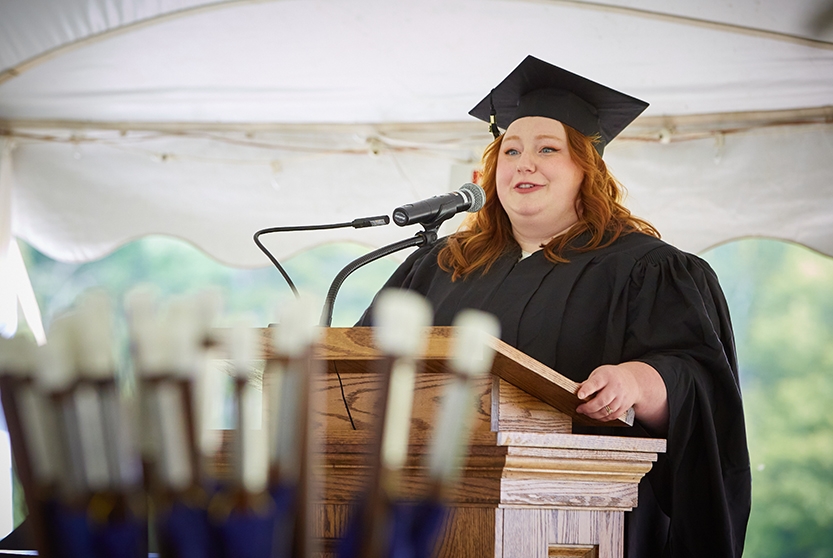
Middlebury president Laurie Patton next took the stage, building on the theme of weirdness. She described the weirdness students and faculty live on the mountain as a collective genius and asked that graduates thank the people who helped them remain weird. She then shifted to reflect on the flooding Vermonters confronted this summer. Floods, Patton asserted, are catastrophic, overwhelming, unimaginable, “primordial” events. Ancient religious stories of flood are about compassion and the attempt to create a new world after the flood. This summer’s graduates, she said, all now have their own “flood stories” and wisdom beyond the ages. She exhorted graduates to tell these flood stories – literal and figurative – to inspire others about survival, hope, rebuilding, and compassion.
Patton then introduced the conferring of degrees. Serving as master’s hooder was Bread Loaf professor Ruth Forman, poet and author of the poetry collections “Prayers Like Shoes” (2009), “Renaissance” (1997), and board books “Curls,” “Glow,” “Bloom,” “Ours,” and “One” (2020-2023). Recipient of the Pen Oakland Josephine Miles Literary Award and the Barnard New Women Poets Prize, she is also a longtime faculty member with the Voices of Our Nations Arts writing program.
The commencement ceremony concluded with the conferring of an honorary Doctor of Letters degree to Shirley Brice Heath, the Margery Bailey Professor Emerita of English and Dramatic Literature and Professor Emerita of Linguistics and Anthropology at Stanford University. Heath taught at Bread Loaf for ten summers between 1982 and 2001. Her ethnographical work in under-resourced communities in Mexico, Australia, US, Great Britain, and South Africa explores the creative arts and sciences, language development, and digital media technology.
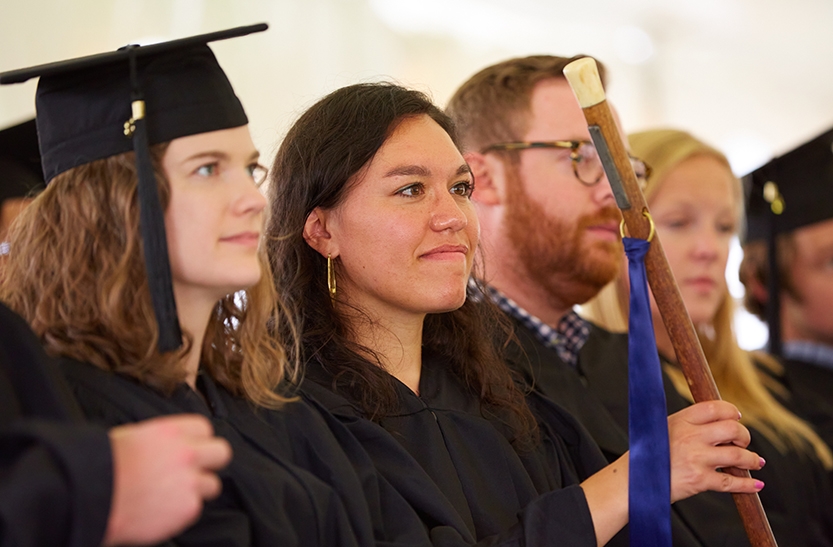
Director Lyndon Dominique closed by thanking the 2023 graduates for contributing to the scholarly life of the campus and a palpable Bread Loaf morale this summer, leading collaborative performance at Pond Readings, advising new students, and presenting insightful independent work. Demonstrating unflappable confidence, enthusiasm, and discipline, they created a dynamic intellectual community and ethos.
At the California campus, participants in Bread Loaf’s Summer Institute in the Global Humanities held a celebration to honor graduating seniors, and all students presented their work at an academic symposium on July 21. Bread Loaf’s Oxford campus held its commencement exercises on Saturday, August 5 at Lincoln College Chapel.
Oxford class of 2023 president Anna Russell Thornton first gave remarks, illustrating the liminal quality of Bread Loaf sessions. For many of her peers, Thornton said, summers of study take place during times of transition and movement in their lives. But from whatever places and backgrounds students come, their worlds intersect here for six weeks and allow for “chaotic, creative possibilities.” In the ephemeral space of Bread Loaf, students have a chance to “practice a new way of being.”
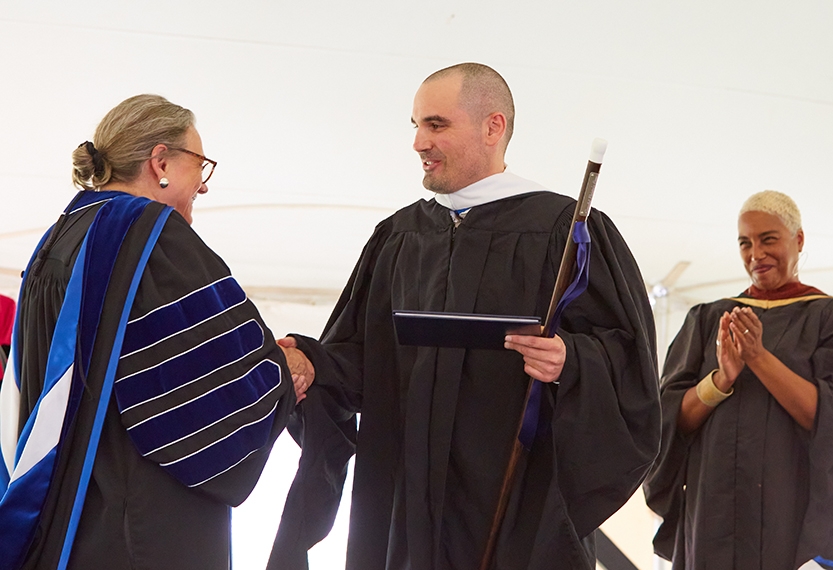
Oxford graduates selected Bread Loaf professor, Fellow of the Royal Society of Literature, Member of the Order of the British Empire, and inaugural poet of Wales Gwyneth Lewis as their hooder and professor Mark Turner as their commencement speaker. Turner is professor of nineteenth and twentieth-century literature at King’s College London and is co-editor of The Routledge Research Companion to Anthony Trollope (2016) and The Complete Works of Oscar Wilde, Vols. VI and VII (2013).
Turner spoke of the tremendous sense of collective intellectual endeavor and adventure he has witnessed at Bread Loaf. But, he said, the kind of sustained inquiry Bread Loaf nurtures requires the sacrifice of separation from family during the summer, and students pursue their serious thought against the strain of a society that decreasingly values the humanities. Turner entreated graduates to remember that the work they do at Bread Loaf does not exist in a bubble. “To see the past is to understand the present, to learn about others is to know oneself, to engage the critical spirit is to connect with the collective,” he said – and Bread Loaf students are ambassadors of this spirit to others through literary study.
Established in 1920, the Middlebury Bread Loaf School of English is one of Middlebury’s summer residential graduate programs, offering courses in literature and the related fields of literacy and pedagogy, creative writing, and theater arts. Students, mostly K-12 English or language arts teachers, come from across the United States and beyond for one or more summers of intensive continuing education. Students may also elect to pursue an MA or MLitt degree in English. Faculty members come from eminent institutions in the U.S. and U.K. to teach and learn with the student body at sites in California, England, and Vermont.

